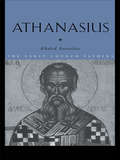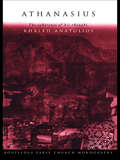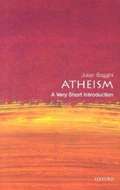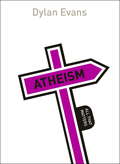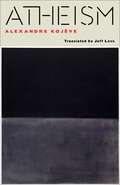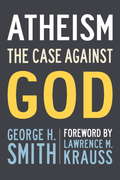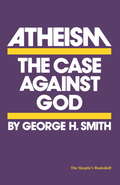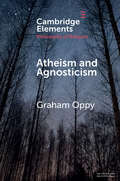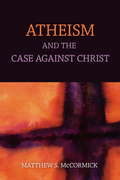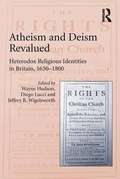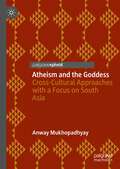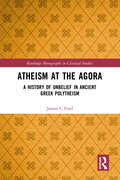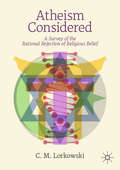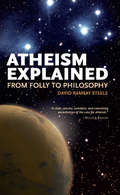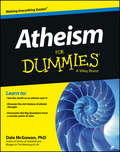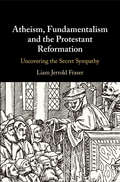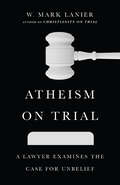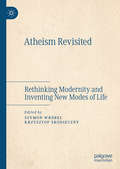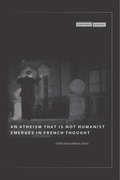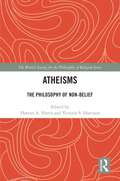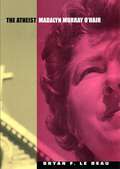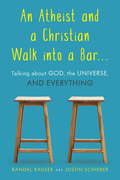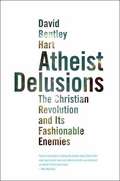- Table View
- List View
Athanasius: The Coherence Of His Thought (The Early Church Fathers)
by Khaled AnatoliosThis book presents the fundamental elements of Athanasius' response to the central questions of the identity of Jesus and the nature of his relationship with God. Providing a useful introduction on his life and work, the book focuses on the tumultuous doctrinal controversies of the day in which he was a central figure. Key selections from his writings, newly translated, have all been chosen with a view to presenting the rationale for Athanasius' fundamental theological positions: the divinity and humanity of Christ, human redemption, the divinity and work of the Holy Spirit, the logic of Christian worship, and the scriptural basis for the doctrinal formulations of the Council of Nicaea. Students of history and classical studies, and even students of religious studies will find this an essential part of their course reading.
Athanasius: The Coherence of his Thought (Routledge Early Church Monographs)
by Khaled AnatoliosIn this volume, Khaled Anatolios presents a comprehensive study of Saint Athanasius, one of the most influential figures in the development of Christian doctrine. He analyzes the coherence of Athanasius' theology by relating the various aspects of his doctrine - God, creation, theological anthropology, Christology and redemption, and the life of grace - to a pervasive emphasis on the radical distinction, and simultaneous relation, between God and world. Athanasius: The Coherence of his Thought provides a systematic account of the overall inner logic of the Athanasian vision. It shows how the various aspects of his doctrine are mutually related and in so doing elucidates the complexities both of Athanasian thought and Christian doctrine in general.
Atheism: A Very Short Introduction
by J. G. Baggini Julian BagginiAtheism is often considered to be a negative, dark, and pessimistic belief which is characterised by a rejection of values and purpose and a fierce opposition to religion. Atheism: A Very Short Introduction sets out to dispel the myths that surround atheism and show how a life without religious belief can be positive, meaningful, and moral. It also confronts the failure of officially atheist states in the twentieth century. The book presents an intellectual case for atheism that rests as much upon positive arguments for its truth as on negative arguments against religion.
Atheism: All That Matters
by Dylan EvansAtheism is becoming increasingly popular and it sometimes feels that much of the western world is now post-religious. But now the initial charge of Richard Dawkins and the new atheists has past, what does atheism really mean? This is the question that Dylan Evans addresses in Atheism: All That Matters, providing a thoughtful and engaging atheist manifesto. What values can atheists share with believers?How can a belief that something doesn't exist still be a belief?Is modern atheism new or just a new form of an old system of values? Building on the work of atheist philosophers and psychologists, he shows how the history of atheist thought has developed and offers fresh ideas for how life has meaning from an atheist perspective. All That Matters about atheism. All That Matters books are a fast way to get right to the heart of key issues.
Atheism
by Alexandre KojèveOne of the twentieth century’s most brilliant and unconventional thinkers, Alexandre Kojève was a Russian émigré to France whose lectures on Hegel in the 1930s galvanized a generation of French intellectuals. Although Kojève wrote a great deal, he published very little in his lifetime, and so the ongoing rediscovery of his work continues to present new challenges to philosophy and political theory. Written in 1931 but left unfinished, Atheism is an erudite and open-ended exploration of profound questions of estrangement, death, suicide, and the infinite that demonstrates the range and the provocative power of Kojève’s thought.Ranging across Heidegger, Buddhism, Christianity, German idealism, Russian literature, and mathematics, Kojève advances a novel argument about freedom and authority. He investigates the possibility that there is not any vantage point or source of authority—including philosophy, science, or God—that is outside or beyond politics and the world as we experience it. The question becomes whether atheism—or theism—is even a meaningful position since both affirmation and denial of God’s existence imply a knowledge that seems clearly outside our capacities. Masterfully translated by Jeff Love, this book offers a striking new perspective on Kojève’s work and its implications for theism, atheism, politics, and freedom.
Atheism: The Case Against God
by Lawrence M Krauss George H. SmithGeorge H. Smith sets out to demolish what he considers the most widespread and destructive of all the myths devised by human beings - the concept of a supreme being. With painstaking scholarship and rigorous arguments, Mr. Smith examines, dissects, and refutes the myriad "proofs" offered by theists - sophisticated, professional theologians - as well as the average religious layman. He explores the historical and psychological havoc wrought by religion in general and concludes that religious belief cannot have any place in the life of modern, rational man."It is not my purpose to convert people to atheism . . . (but to) demonstrate that the belief in God is irrational to the point of absurdity. If a person wishes to continue believing in a god, that is his prerogative, but he can no longer excuse his belief in the name of reason and moral necessity."
Atheism: The Case against God
by George H. SmithDoes a god exist? This question has undoubtedly been asked, in one form or another, since man has had the ability to communicate. . . Thousands of volumes have been written on the subject of a god, and the vast majority have answered the questions with a resounding 'Yes!'You are about to read a minority viewpoint. With this intriguing introduction, George H. Smith sets out to demolish what he considers the most widespread and destructive of all the myths devised by man - the concept of a supreme being. With painstaking scholarship and rigorous arguments, Mr. Smith examines, dissects, and refutes the myriad proofs offered by theists - the defenses of sophisticated, professional theologians, as well as the average religious layman. He explores the historical and psychological havoc wrought by religion in general - and concludes that religious belief cannot have any place in the life of modern, rational man. It is not my purpose to convert people to atheism . . . (but to) demonstrate that the belief in God is irrational to the point of absurdity. If a person wishes to continue believing in a god, that is his prerogative, but he can no longer excuse his belief in the name of reason and moral necessity. . . . welcome, hard-hitting. -Publishers Weekly
Atheism
by George H. Smith"Does a god exist? This question has undoubtedly been asked, in one form or another, since man has had the ability to communicate. . . Thousands of volumes have been written on the subject of a god, and the vast majority have answered the questions with a resounding 'Yes!' ""You are about to read a minority viewpoint."With this intriguing introduction, George H. Smith sets out to demolish what he considers the most widespread and destructive of all the myths devised by man - the concept of a supreme being. With painstaking scholarship and rigorous arguments, Mr. Smith examines, dissects, and refutes the myriad "proofs" offered by theists - the defenses of sophisticated, professional theologians, as well as the average religious layman. He explores the historical and psychological havoc wrought by religion in general - and concludes that religious belief cannot have any place in the life of modern, rational man."It is not my purpose to convert people to atheism . . . (but to) demonstrate that the belief in God is irrational to the point of absurdity. If a person wishes to continue believing in a god, that is his prerogative, but he can no longer excuse his belief in the name of reason and moral necessity."
Atheism: All That Matters (All That Matters)
by Dylan EvansAtheism is becoming increasingly popular and it sometimes feels that much of the western world is now post-religious. But now the initial charge of Richard Dawkins and the new atheists has passed, what does atheism really mean? This is the question that Dylan Evans addresses in Atheism: All That Matters, providing a thoughtful and engaging atheist manifesto.What values can atheists share with believers? How can a belief that something doesn't exist still be a belief? Is modern atheism new or just a new form of an old system of values? Building on the work of atheist philosophers and psychologists, he shows how the history of atheist thought has developed and offers fresh ideas for how life has meaning from an atheist perspective.All That Matters about atheism. All That Matters books are a fast way to get right to the heart of key issues.
Atheism and Agnosticism (Elements in the Philosophy of Religion)
by Graham OppyThis book is an elementary introduction to atheism and agnosticism. It begins with a careful characterisation of atheism and agnosticism, distinguishing them from many other things with which they are often conflated. After a brief discussion of the theoretical framework within which atheism and agnosticism are properly evaluated, it then turns to the sketching of cases for atheism and agnosticism. In both cases, the aim is not conviction, but rather advancement of understanding: the point of the cases is to make it intelligible why some take themselves to have compelling reason to adopt atheism or agnosticism.
Atheism And The Case Against Christ
by Matthew S. MccormickHundreds of millions of people believe that Jesus came back from the dead. This cogent, forcefully argued book presents a decidedly unpopular view --namely, that the central tenet of Christianity, the resurrection of Jesus, is false. The author asks a number of probing questions: Is the evidence about Jesus as it has been relayed to us over the centuries of sufficient quantity and quality to justify belief in the resurrection? How can we accept the resurrection but reject magic at the Salem witch trials? What light does contemporary research about human rationality from the fields of behavioral economics, empirical psychology, cognitive science, and philosophy shed on the resurrection and religious belief? Can we use contemporary research about the reliability of people's beliefs in the supernatural, miracles, and the paranormal to shed light on the origins of Christianity and other religions? Does it make sense that the all-powerful creator of the universe would employ miracles to achieve his ends? Can a Christian believe by faith alone and yet reasonably deny the supernatural claims of other religions? Do the arguments against Christianity support atheism? By carefully answering each of these questions, this book undermines Christianity and theism at their foundations; it gives us a powerful model for better critical reasoning; and it builds a compelling case for atheism. Without stooping to condescension or arrogance, the author offers persuasive arguments that are accessible, thoughtful, and new.
Atheism and Deism Revalued: Heterodox Religious Identities in Britain, 1650-1800
by Wayne Hudson Diego LucciGiven the central role played by religion in early-modern Britain, it is perhaps surprising that historians have not always paid close attention to the shifting and nuanced subtleties of terms used in religious controversies. In this collection particular attention is focussed upon two of the most contentious of these terms: ’atheism’ and ’deism’, terms that have shaped significant parts of the scholarship on the Enlightenment. This volume argues that in the seventeenth and eighteenth century atheism and deism involved fine distinctions that have not always been preserved by later scholars. The original deployment and usage of these terms were often more complicated than much of the historical scholarship suggests. Indeed, in much of the literature static definitions are often taken for granted, resulting in depictions of the past constructed upon anachronistic assumptions. Offering reassessments of the historical figures most associated with ’atheism’ and ’deism’ in early modern Britain, this collection opens the subject up for debate and shows how the new historiography of deism changes our understanding of heterodox religious identities in Britain from 1650 to 1800. It problematises the older view that individuals were atheist or deists in a straightforward sense and instead explores the plurality and flexibility of religious identities during this period. Drawing on the most recent scholarship, the volume enriches the debate about heterodoxy, offering new perspectives on a range of prominent figures and providing an overview of major changes in the field.
Atheism and the Goddess: Cross-Cultural Approaches with a Focus on South Asia
by Anway MukhopadhyayThis book seeks to explore the complex modes of interface between religion, atheism, and the Goddess in multicultural contexts. While atheism has often been seen as an interrogation of and a battle against God, the gender dimension of this discourse has not been sufficiently negotiated. Is the fight against God also a fight against the Goddess? Or is there something common between the ideological thrust of the battle against God the “Father” in atheism and the interrogation of the Divine Father in thealogy? Can the Goddess be seen as an entity radically different from the imperious transcendental that the atheists find embodied in God the Father? Or, can the Goddess be seen as “transcendental” as well as immanent, and hence subjected to the same atheist denial of transcendence to which God is subjected in non-theistic or anti-theistic arguments? With this volume, Anway Mukhopadhyay embarks on a difficult project of epistemologically, ideologically and even politically renegotiating and reorienting some of the fundamental issues involved in the discussions of and debates over atheism.
Atheism at the Agora: A History of Unbelief in Ancient Greek Polytheism (Routledge Monographs in Classical Studies)
by James C FordThis fresh, comprehensive study of ancient Greek atheism aims to dismantle the current consensus that atheism was ‘unthinkable’ in ancient Greece, demonstrating instead that atheism was not only thinkable but inextricably embedded in the Greek religious environment. Through careful analysis of a wide range of source material provided in modern English translation, and drawing on philosophy, theology, sociology, and other disciplines, Ford unpicks a two and a half thousand-year history of marginalisation, clearing the way for a new analysis. He lays out in clear terms the nature and form of ancient Greek atheism as the ancient Greeks conceived of it, through a series of themes and lenses. Topics such as religious socialisation, the interaction of atheist philosophy and theology, identity formation through alterity, and the use of atheism in scapegoating are considered not only in broad terms, using a synthesis of modern scholarship to mark out an overview in line with modern consensus, but also by drawing on the unique perspective of ancient atheism Ford is able to provide innovative theories about a range of subjects. Atheism at the Agora is of interest to students and scholars in Classics, particularly Greek religion and culture, as well as those studying atheism in other historical and contemporary areas, religious studies, philosophy, and theology.
Atheism Considered: A Survey of the Rational Rejection of Religious Belief
by C.M. LorkowskiAtheism Considered is a systematic presentation of challenges to the existence of a higher power. Rather than engage in polemic against a religious worldview, C.M. Lorkowski charitably refutes the classical arguments for the existence of god, pointing out flaws in their underlying reasoning and highlighting difficulties inherent to revealed sources. In place of a theistic worldview, he argues for adopting a naturalistic one, highlighting naturalism’s capacity to explain world phenomena and contribute to the sciences. Lorkowski demonstrates that replacing theism with naturalism, contra popular assumptions, sacrifices nothing in terms of ethics or meaning. Instead, morality ultimately proves more important than religion and does not rely on it. Appropriate for classroom use, this book is meant to cultivate understanding, tolerance, and fruitful dialogue between believers and nonbelievers.
Atheism Explained
by David Ramsay SteeleAtheism Explained explores the claims made both for and against the existence of God. On the pro side: that the wonders of the world can only be explained by an intelligent creator; that the universe had to start somewhere; telepathy, out-of-body experiences, and other paranormal phenomena demonstrate the existence of a spirit world; and that those who experience God directly provide evidence as real as any physical finding. After disputing these arguments through calm, careful criticism, author David Ramsay Steele presents the reasons why God cannot exist: monstrous, appalling evils; the impossibility of omniscience; and the senseless concept that God is a thinking mind without a brain. He also explores controversial topics such as Intelligent Design, the power of prayer, religion without God, and whether a belief in God makes people happier and healthier. Steele's rational, easy-to-understand prose helps readers form their own conclusions about this eternally thorny topic.
Atheism For Dummies
by Dale McgowanThe easy way to understand atheism and secular philosophyFor people seeking a non-religious philosophy of life, as well as believers with atheist friends, Atheism For Dummies offers an intelligent exploration of the historical and moral case for atheism. Often wildly misunderstood, atheism is a secular approach to life based on the understanding that reality is an arrangement of physical matter, with no consideration of unverifiable spiritual forces.Atheism For Dummies offers a brief history of atheist philosophy and its evolution, explores it as a historical and cultural movement, covers important historical writings on the subject, and discusses the nature of ethics and morality in the absence of religion.A simple, yet intelligent exploration of an often misunderstood philosophyExplores the differences between explicit and implicit atheismA comprehensive, readable, and thoroughly unbiased resourceAs the number of atheists worldwide continues to grow, this book offers a broad understanding of the subject for those exploring atheism as an approach to living.
Atheism, Fundamentalism and the Protestant Reformation: Uncovering the Secret Sympathy
by Liam Jerrold FraserIn this study of new atheism and religious fundamentalism, this book advances two provocative - and surprising - arguments. Liam Jerrold Fraser argues that atheism and Protestant fundamentalism in Britain and America share a common historical origin in the English Reformation, and the crisis of authority inaugurated by the Reformers. This common origin generated two presuppositions crucial for both movements: a literalist understanding of scripture, and a disruptive understanding of divine activity in nature. Through an analysis of contemporary new atheist and Protestant fundamentalist texts, Fraser shows that these presuppositions continue to structure both groups, and support a range of shared biblical, scientific, and theological beliefs. Their common historical and intellectual structure ensures that new atheism and Protestant fundamentalism - while on the surface irreconcilably opposed - share a secret sympathy with one another, yet one which leaves them unstable, inconsistent, and unsustainable.
Atheism on Trial: A Lawyer Examines the Case for Unbelief
by W. Mark LanierIn the courtroom, lawyers depend on rules of evidence to make their arguments. A case is made by establishing certain facts from which proof can be determined. But what happens when the truth seems to be a matter of faith? Can the legal mind discern the validity of one's belief or unbelief? Nationally recognized trial lawyer Mark Lanier turns his analytical mind to the arguments for atheism and agnosticism. With critical thinking and precision of thought, he examines the rationales made for unbelief and assesses them on their own terms, finding points of strength and weakness in their logic and coherence. He considers whether atheistic frameworks give satisfactory and consistent explanatory answers for understanding human existence and the world around us. He cross-examines the strongest arguments of prominent atheists and also interrogates the questions of agnostics as to whether God is knowable. Through his evenhanded, levelheaded approach, Lanier challenges us all to decide for ourselves what we believe.
Atheism Revisited: Rethinking Modernity and Inventing New Modes of Life
by Szymon Wróbel Krzysztof SkoniecznyAtheism Revisited is a collection of essays that explore the multifaceted nature of atheism. Starting from the notion that today’s atheism is shaped by the defining processes of Modernity—such as secularization and the breakup of science, philosophy, and theology—the first part of the book undertakes a thorough scrutiny of Modern atheisms, from Spinoza and Hobbes to Marx and Nietzsche. The second part of the book seeks to draw practical conclusions from this scrutiny and answer the questions: what is the state of atheism today? What is the role of an atheist in a world affected by religious fundamentalisms? What should the relationship between atheists and religious people look like? The wide scope of the book allows readers to see atheism as a central concern of many intellectual movements, from Marxism and French Theory to post-secularism and the reevaluation of Modernity, and to understand atheism as a focal point of the most important contemporary philosophical debates.
An Atheism That Is Not Humanist Emerges in French Thought
by Stefanos GeroulanosIf the 19th century was marked by a "Death of God," than the 20th century evolution of French philosophical and political thought can be said to be marked by the "Death of Man," in that humanism (placing the human at the center of understandings of knowledge, thought, and ethics) came to be seen by many as inextricably tied to some of the worst disasters of the modern era. Geroulanos (modern European intellectual history, New York U. ) reconstructs the development of this intellectual trend in France during the second quarter of the 20th century, arguing that it should be understood in terms of a synthesis of the interconnected movements of the development of an anti-humanist atheism, the emergence of a negative philosophical anthropology, and the elaboration of critiques of humanism. Annotation ©2010 Book News, Inc. , Portland, OR (booknews. com)
Atheisms: The Philosophy of Non-Belief (The British Society for the Philosophy of Religion Series)
by Harriet A. Harris Victoria S. HarrisonQuestions about how to negotiate belief and non-belief in social and public spheres are attracting an increasing amount of attention from academics in a range of disciplines, and from concerned members of the public. This volume addresses the emergence of ‘new atheism’ and the developing ‘spiritual but not religious’ phenomenon. Avoiding simplistic accounts of atheism, and of religious belief, it provides readers with insight into a wide range of nuances within theism and atheism, as well as spiritual practice and faith. The chapters by an international panel of contributors focus on topics such as: a typology or cartography of atheisms and agnosticism; contrasting types of atheism within Christianity and Buddhism; questions about cognitive and doxastic stances in atheisms; theist rejections of and atheist embracing of ‘God’; and atheist aesthetics. Reaching beyond the Christian tradition, the book will be of particular interest to scholars of the philosophy of religion, as well as religious studies and theology more generally.
The Atheist: Madalyn Murray O'Hair
by Bryan F. BeauThe first biography of the colorful life Madalyn Murray O'Hair—America's most famous (and despised) atheistIn 1964, Life magazine called Madalyn Murray O’Hair “the most hated woman in America.” Another critic described her as “rude, impertinent, blasphemous, a destroyer not only of beliefs but of esteemed values.”In this first full-length biography, Bryan F. Le Beau offers a penetrating assessment of O’Hair’s beliefs and actions and a probing discussion of how she came to represent both what Americans hated in their enemies and feared in themselves. Born in 1919, O’Hair was a divorced mother of two children born out of wedlock. She launched a crusade against God, often using foul language as she became adept at shocking people and making effective use of the media in delivering her message. She first gained notoriety as one of the primary litigants in the 1963 case Murray v. Curlett which led the Supreme Court to ban school prayer. The decision stunned a nation engaged in fighting “godless Communism” and made O’Hair America’s most famous—and most despised—atheist. O’Hair led a colorful life, facing assault charges and extradition from Mexico, as well as the defection of her son William, who as an adult denounced her. She later served as Hustler publisher Larry Flynt’s chief speech writer in his bid for President of the United States.Drawing on original research, O’Hair’s diaries, and interviews, Le Beau traces her development from a child of the Depression to the dictatorial, abrasive woman who founded the American Atheists, wrote books denouncing religion, and challenged the words “Under God” in the Pledge of Allegiance, “In God We Trust” on American currency, the tax exempt status of religious organizations, and other activities she saw as violating the separation of church and state.O’Hair remained a spokesperson for atheism until 1995, when she and her son and granddaughter vanished. It was later discovered that they were murdered by O’Hair’s former office manager and an accomplice.Fast-paced, engagingly written, and sharply relevant to ongoing debates about school prayer and other religious issues, The Atheist tells the colorful life-story of a woman who challenged America’s most deeply held beliefs.
An Atheist and a Christian Walk into a Bar: Talking about God, the Universe, and Everything
by Justin Schieber Randal RauserThe question of God is simply too important--and too interesting--to leave to angry polemicists. That is the premise of this friendly, straightforward, and rigorous dialogue between Christian theologian Randal Rauser and atheist Justin Schieber. Setting aside the formality of the traditional debate, the authors invite the reader to join them in an extended, informal conversation. This has the advantage of easing readers into thorny topics that in a debate setting can easily become confusing or difficult to follow. Like any good conversation, this one involves provocative arguments, amusing anecdotes, and some lively banter. Rauser and Schieber begin with the question of why debates about God still matter. They then delve into a number of important topics: the place of reason and faith, the radically different concepts of God in various cultures, morality and its traditional connection with religious beliefs, the problem of a universe that is overwhelmingly hostile to life as we know it, mathematical truths and what they may or may not say about the existence of God, the challenge of suffering and evil to belief in God, and more. Refreshingly upbeat and amicable throughout, this stimulating conversation between two friends from opposing points of view is an ideal introduction to a perennial topic of debate.From the Trade Paperback edition.
Atheist Delusions: The Christian Revolution and Its Fashionable Enemies
by David Bentley HartTHIS BOOK IS IN NO SENSE an impartial work of history. Perfect detachment is impossible for even the soberest of historians, since the writing of history necessarily demands some sort of narrative of causes and effects, and is thus necessarily an act of interpretation, which by its nature can never be wholly free of prejudice. But I am not really a historian, in any event, and I do not even aspire to detachment. In what follows, my prejudices are transparent and unreserved, and my argument is in some respects willfully extreme (or so it might seem). I think it prudent to admit this from the outset, if only to avoid being accused later of having made some pretense of perfect objectivity or neutrality so as to lull the reader into a state of pliant credulity. What I have written is at most a "historical essay," at no point free of bias, and intended principally as an apologia for a particular understanding of the effect of Christianity upon the development of Western civilization.
